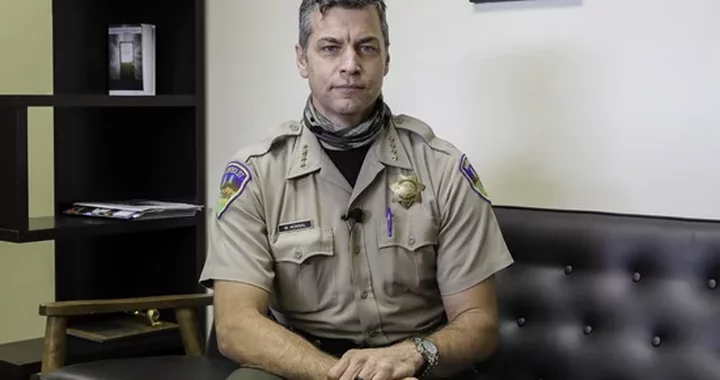Sheriff Billy Honsal. YouTube screenshot, file photo.
Earlier this month, Supervisor Mike Wilson woke to find his car had been stolen from outside his Arcata home. He called the Arcata Police Department. He posted something on Facebook. And he texted Sheriff William Honsal.
This happened over the weekend of Sept. 10-11. The following Monday, just after noon, Honsal sent this email to county deputies, with cc:’s to department leadership and the dispatch center. It read:
Good Morning Patrol,
I will give a $40 Dutch Bros card to anyone that locates and recovers Supervisors Mike Wilsons Stolen Vehicle.
Description: [redacted]
There have been sittings [sic] in Orick and Rio Dell. If you recover it, please send me a copy of the 180 for payment.
A couple of hours later, a deputy wrote the Sheriff back to ask for details about the sighting of the vehicle in Rio Dell, and promised to look for it later. That was the sum total of email correspondence about the matter sent or received by the Sheriff, according to the results of a Public Records Act request filed by the Outpost.
As it happened, Supervisor Wilson’s car was found shortly after this near Red Bluff, so apparently no member of the Sheriff’s Office was able to claim their $40 bonus in the form of coffee-based beverages. But the incident may leave a bitter taste in the mouth of some Humboldt County citizens, along with some questions. Is it right for the Sheriff to offer extra incentive to officers for solving crimes affecting people with some status in the community – in this case, a person who is one-fifth responsible for setting the Sheriff’s Office’s budget, and indeed the Sheriff’s own salary?
Ed Obayashi is a deputy sheriff and legal advisor to numerous police agencies in California, and a law enforcement trainer who has provided services to departments around the state, including in Humboldt County. Told about the details of the case recently, Obayashi said his concern would be that “the optics are obviously not conducive to an impression of equal service.”
“There’s nothing illegal about it, and probably they don’t even have a policy that prohibits it, or addresses it,” Obayashi said. “Just from an optics standpoint, there would probably be some in the community who would question that the leader of a law enforcement agency may be going out of his way to provide a financial incentive, when the department would not do that for the typical crime victim.”
Honsal had little to say about the particulars of the incident when the Outpost wrote to ask for comment. We asked whether he had second thoughts about the appropriateness of offering incentives to his officers to solve certain crimes. We asked what he might say to a different person whose car had been stolen recently, who presumably didn’t get the same treatment.
“Thanks for your inquiry,” Honsal responded, via the office’s public information officer. “I regularly incentivize persistence, dedication, and all-around good work for public servants within my department.”
The law enforcement officer who originally alerted us to this affair had a different take, though. In his letter, he took offense to the notion that sworn officers needed perks such as this to prod them to do police work, and he wondered whether political favoritism was at play in this case.
“I find it appauling [sic] that a Sheriff would have to pay his guys extra to do their jobs,” he wrote in a letter to the Outpost. “If accepting this type of gratuity is common at HCSO, I think we as a community should be alarmed.”
For his part, Wilson said that he had no idea that Honsal had placed a bounty on his case until the Outpost informed him of it, and that he had no intention of seeking special consideration. He said he regrets having sent the text.
“In the emotion of having a car stolen, I reached out to, really, the only police officer I know,” Wilson said. “I was just not mindful in that moment. If I’d given it more thought, I wouldn’t have done it, for all the obvious reasons.”
DOCUMENT:

CLICK TO MANAGE